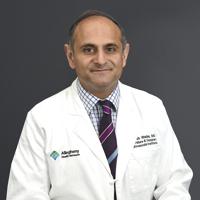Learn more about our appointment options, second opinions, locations, referrals, and resources.
AHN Heart Failure Program
AHN Heart Failure Program overview
The AHN Heart Failure Program provides ongoing care to relieve symptoms and delay heart failure disease progression. We also provide pre- and post-surgical care for people who undergo heart surgery, get mechanical circulatory support devices, or receive a heart transplant. Our specialists at the heart failure clinic diagnose and treat all stages of congestive heart failure.
Heart failure is a serious condition that can make it challenging to complete daily activities. When the heart struggles to pump blood efficiently, it can lead to various symptoms that can impact your quality of life and result in dysfunction of other organ systems.
Our heart failure clinic treats a range of heart conditions within these specialized programs:
- Transplant Program
- Amyloidosis Program
- Mechanical Support Program
- Hypertrophic Cardiomyopathy Program
- Pulmonary Hypertension Program
- CTEPH Program
The AHN Heart Failure Program has a multidisciplinary team of experts in heart failure and related cardiovascular specialties who collaborate to provide individualized care. Depending on your condition, the following divisions of care are involved:
- Heart Failure and Transplant Division
- Cardiac Surgery
- Electrophysiology
- Interventional Cardiology
How we treat heart failure conditions
Recognized by the American Heart Association, the AHN Heart Failure Program is among the best in the country. Our cardiac specialists stay up to date on the latest innovations for diagnosing, treating, and managing various heart conditions.
Conditions we treat
Heart failure is a condition that occurs when the heart doesn’t pump blood as efficiently as it should. This causes blood pressure within the heart to increase, making vital organs unable to receive the proper supply of oxygen-rich nutrients.
When heart failure is associated with congestion or fluid retention, it’s referred to as congestive heart failure. The fluid retention can be located in the legs, ankles, lungs (pulmonary congestion or pulmonary edema), abdomen (ascites), or liver (hepatic congestion).
Types of heart failure include:
- Left-sided heart failure: The heart’s left ventricle is an important chamber that delivers oxygen and blood to the body’s organs. Left-sided heart failure affects all organs. These are the two types of left-sided heart failure:
- Systolic (HFrEF): This type happens when the heart muscle doesn’t contract with enough force, leading to less oxygen in the blood being pumped around the body.
- Diastolic (HFpEF): This type happens when the heart contracts as it should, but the left ventricle is stiff, causing pressure inside the heart to increase.
- Right-sided heart failure: The right ventricle inside the heart normally pumps blood into the lungs. When the heart is too weak, the blood moves backward into the veins and usually causes swelling in the abdomen, legs, ankles, and feet.
- Acute heart failure: Also known as decompensated heart failure, this life-threatening condition happens when the heart struggles to deliver oxygen to the body.
- Cardiogenic shock: This occurs when a sudden or progressive loss of heart function results in extremely low blood pressure. When the heart can’t pump the necessary blood to vital organs and tissues, it can cause life-threatening organ dysfunction.
- Hypertrophic cardiomyopathy: This serious condition happens when the walls of the heart thicken, causing it to function improperly. Hypertrophic cardiomyopathy may lead to death from cardiac arrest if left untreated. Learn more about Hypertrophic cardiomyopathy.
- Cardiac sarcoidosis: This rare disease causes your body to make scar tissue as a response to inflammation. As a result, inflammation can affect the electric system of the heart, causing heart block (slow heart rhythms). This disease may also result in dangerously fast heart rhythms from the ventricles, which can cause palpitation or even sudden cardiac arrest. If unrecognized or untreated, sarcoidosis can also cause weakness of the heart muscle and congestive heart failure.
- Cardiac amyloidosis: Amyloidosis is a group of diseases caused when one or more organs receive an abnormal deposit of amyloid proteins that cause stiffness of the heart muscle and can result in congestive heart failure and atrial fibrillation (irregular heartbeats). Learn more about Cardiac amyloidosis.
Heart failure diagnostics
The AHN Heart Failure Program uses best-in-class imaging and diagnostic tools to help determine the nature, type, and severity of a heart failure condition. Cutting-edge technologies allow us to assess symptoms and determine the type of failure, so we can protect your heart while preventing further damage.
Learn more about congestive heart failure, including symptoms, diagnosis, and treatment options.
Treatment options
- Left ventricular assist device (LVAD) therapy: This mechanical device supports the heart as it tries to pump blood from its lower chambers to the body's organs and tissues.
- Heart transplantation: A heart transplant surgery is often a last resort for those with end-stage heart failure who aren’t improving with treatment. Although it’s a major procedure, you can experience a successful, full recovery with proper follow-up care. Learn more about Heart transplantation.
Advanced comprehensive care
Our team of cardiologists, nurses, cardiothoracic surgeons, pharmacists, nutritionists, and social workers are experts in advanced heart failure and transplant cardiology. By working with patients before heart failure develops, our fellowship-trained, board-certified physicians can connect you to programs that seek to prevent or delay the progression of heart failure and other related conditions.
Through these AHN Heart Failure Programs, our team can provide patients with integrated support and assist in the prevention, preparation, management, and treatment of heart failure:
- Hypertrophic Cardiomyopathy Program
- Cardiac Sarcoidosis Program
- Cardiac Amyloidosis Program
Why choose us?
When you visit the AHN Heart Failure Program, you’re met with experts ready to help. Celebrated as one of the best in the country, our specialized heart failure clinic has been recognized for its excellence by the American Heart Association. We offer a unique approach to medical care with a collaborative team of highly skilled heart medicine experts dedicated to treating various cardiac conditions and symptoms.
Efficiency
You have access to cutting-edge testing and imaging through the heart failure clinic. Our network of specialists diagnose and interpret results while working together to provide you with an effective treatment plan tailored to your specific needs.
Coordination
The AHN Heart Failure Program allows you to meet with several specialists to help determine the best treatment plan for your unique situation. Our team of experts reviews your condition, diagnosis, management, and progress while collaborating to develop an individualized care plan.
Home monitoring
To provide the latest in heart failure technology, we’ve introduced the use of an implantable device called the CardioMEMS™ for daily monitoring. This state-of-the-art tool sends daily readings to our team, alerting us of early signs of heart failure symptoms before they start. By monitoring remotely 24/7, we can adjust treatments as necessary to help prevent symptoms of heart failure and emergent hospitalization.
Expertise
Our team of board-certified physicians has received specialized training in the care of heart failure. With experience working alongside world-renowned heart specialists, our heart failure doctors offer expertise on another level. We’re proud to provide you with the most innovative technologies, procedures, and treatment options.
Program leaders

Advanced Heart Failure and Transplant
Heart failure cardiologists

Advanced Heart Failure and Transplant

Advanced Heart Failure and Transplant

Advanced Heart Failure and Transplant

Advanced Heart Failure and Transplant

Interventional Cardiology
Heart failure staff
Courtney Hippert, PA-C, Lead APP
Gina Duncan, PA-C
Kelly Gramling, CRNP
Madison Twardy, PA-C
Tracey Ater, Practice Manager
Alysa Pivik, CRNP
Cosette Motta, PA-C
Jennifer Keeley, DNP
Angela Brown, RN Director of Transplant and LVAD
Heart failure/pulmonary hypertension coordinators and Program coordinators
Lisa Mace, RN
Amy Alfonsi, RN
Meloney Thornton, RN
Kimberly Curry, RN
Kileigh Barnes, RN
Jessica Danko, RN
Katie Rapp, RN
Terri Thieret, RN
Kathleen Ridgeway, RN
Locations
Allegheny General Hospital
320 East North Avenue
Pittsburgh, PA 15212
GET DIRECTIONS
Wexford Health + Wellness Pavilion
12311 Perry Highway
Wexford, PA 15090
GET DIRECTIONS
Saint Vincent Hospital
232 West 25th Street
Erie, PA 16544
GET DIRECTIONS
Jefferson Hospital
565 Coal Valley Road
Jefferson Hills, PA 15025
GET DIRECTIONS
AHN Grove City
631 N. Broad Street Ext.
Grove City, PA 16127
GET DIRECTIONS
CardioMEMS™ is a trademark of Abbott or its related companies and used with permission.
AHN Heart Failure Program appointments and information
Not yet diagnosed
Call (412) DOCTORS or (412) 362-8677 to see your primary care provider to explore all possible causes of your symptoms. Depending on your symptoms, they can determine if you need to see a general cardiologist for further evaluation.
Second opinions
If you’re diagnosed with heart failure and are seeking specialized care or a second opinion for your condition, call (412) 359-3551 or email tracey.ater@ahn.org to connect with Tracey Ater, the AHN Heart Failure Program practice manager.
Heart failure research
AHN Cardiovascular Research Institute
AHN’s Cardiovascular Research Institute is established on more than 100 years of innovation with diverse areas of focus, including research for the latest heart disease treatments and cardiac technology. Our qualified team and heart failure doctors take pride in using new devices and medications, as well as state-of-the-art devices, technology, and therapies, to help revolutionize care for heart disease.
What is a clinical trial?
Clinical trials are special research opportunities that explore medical treatments, strategies, or devices to ensure they’re safe and effective for humans.
Active clinical trials
By prioritizing research and innovation, our physicians and patients are engaged in more than 100 national and international clinical trials. Participating in these trials gives AHN patients special access to some of the newest potential treatment options for heart failure. Participation in clinical trials is based on meeting eligibility criteria.
To express interest in a clinical trial or to learn more about research opportunities, check out our active clinical trials.
AHN Heart Failure Program information for health care professionals
Referrals
For referrals, call (412) 359-4773 or email the AHN Heart Failure Program practice manager, Tracey Ater, at tracey.ater@ahn.org.
For urgent referrals, please get in touch with the heart failure attending physician on call at Allegheny General Hospital, 24/7, at (412) 359-6444.
Non-AHN providers can use the EpicCare® Link™ platform to view updates on their patients’ care within AHN after the initial referral is completed.
Medical records
If you need access to specific test results or imaging not provided in the EpicCare® Link™ platform, please fill out a medical record request form.
EpicCare® is a registered trademark of Epic Systems Corporation and used with permission.
EpicCare® Link™ is a trademark of Epic Systems Corporation and used with permission.

